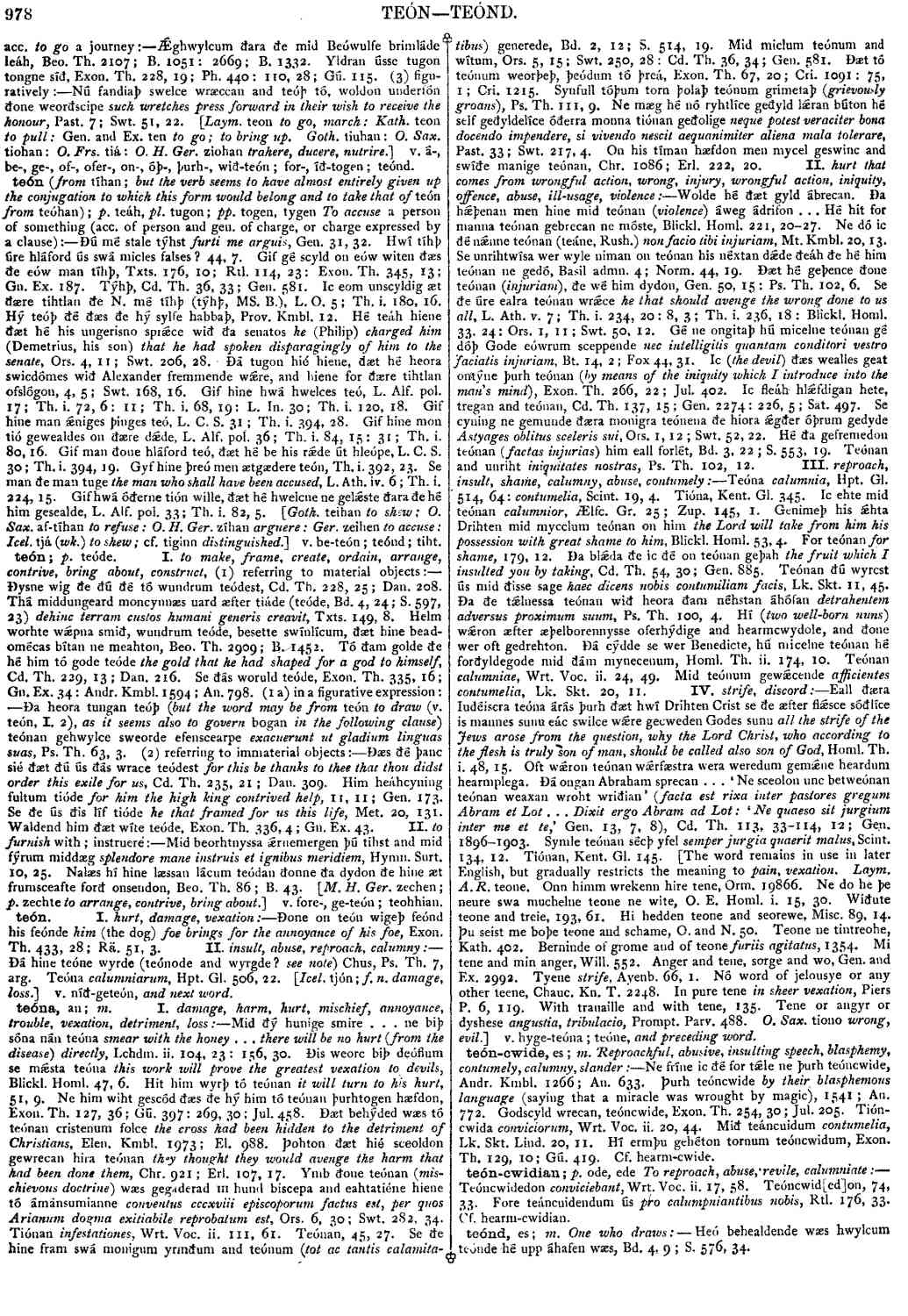teóna
- noun [ masculine ]
-
Mid ðý hunige smire . . . ne biþ sóna nán teóna
smear with the honey . . . there will be no hurt (from the disease) directly,
- Lchdm. ii. 104, 23: 156, 30.
-
Ðis weorc biþ deóflum se mǽsta teóna
this work will prove the greatest vexation to devils,
- Blickl. Homl. 47, 6.
-
Hit him wyrþ tó teónan
it will turn to his hurt,
- 51, 9.
-
Ne him wiht gescód ðæs ðe hý him tó teónan þurhtogen hæfdon,
- Exon. Th. 127, 36; Gú. 397: 269, 30; Jul. 458.
-
Ðæt behýded wæs tó teónan cristenum folce
the cross had been hidden to the detriment of Christians,
- Elen. Kmbl. 1973; El. 988.
-
Þohton ðæt hié sceoldon gewrecan hira teónan
they thought they would avenge the harm that had been done them,
- Chr. 921; Erl. 107, 17.
-
Ymb ðone teónan (mischievous doctrine) wæs gegaederad III hund biscepa and eahtatiéne hiene tó ámansumianne
conventus cccxviii episcoporum factus est, per quos Arianum dogma exitiabile reprobatum est,
- Ors. 6, 30; Swt. 282, 34.
-
Tiónan
infestationes,
- Wrt. Voc. ii. 111, 61.
-
Teóan,
- 45, 27.
-
Se ðe hine fram swá monigum yrmðum and teónum (
tot ac tantis calamitatibus
) generede,- Bd. 2, 12; S. 514, 19.
-
Mid miclum teónum and wítum,
- Ors. 5, 15; Swt. 250, 28: Cd. Th. 36, 34; Gen. 581.
-
Ðæt tó teónum weorþeþ, þeódum tó þreá,
- Exon. Th. 67, 20; Cri. 1091: 75, 1; Cri. 1215.
-
Synfull tóþum torn þolaþ teónum grimetaþ (
grievously groans
),- Ps. Th. 111,
9.
-
Ne mæg hé nó ryhtlíce geðyld lǽran búton hé self geðyldelíce óðerra monna tiónan geðolige
neque potest veraciter bona docendo impendere, si vivendo nescit aequanimiter aliena mala tolerare,
- Past. 33; Swt. 217, 4.
-
On his tíman hæfdon men mycel geswinc and swíðe manige teónan,
- Chr. 1086; Erl. 222, 20.
-
Wolde hé ðæt gyld ábrecan. Ða hǽþenan men hine mid teónan (
violence
) áweg ádrifon . . . Hé hit for manna teónan gebrecan ne móste,- Blickl. Homl. 221, 20-27.
-
Ne dó ic ðé nǽnne teónan (teáne, Rush.)
non facio tibi injuriam,
- Mt. Kmbl. 20, 13.
- Se unrihtwísa wer wyle niman on teónan his néxtan dǽde ðeáh ðe hé him teónan ne gedó, Basil admn. 4; Norm. 44, 19.
-
Ðæt hé geþence ðone teónan (
injuriam
), ðe wé him dydon,- Gen.
50, 15: Ps. Th. 102, 6.
-
Se ðe úre ealra teónan wrǽce
he that should avenge the wrong done to us all,
- L. Ath. v. 7; Th. i. 234, 20: 8, 3; Th. i. 236, 18: Blickl. Homl. 33,
24: Ors. 1, 11; Swt. 50, 12.
-
Gé ne ongitaþ hú micelne teónan gé dóþ Gode eówrum sceppende
nec intelligitis quantam conditori vestro faciatis injuriam,
- Bt. 14, 2; Fox 44, 31.
-
Ic (
the devil) ðæs wealles geat ontýne þurh teónan (by means of the iniquity which I introduce into the man's mind ),
- Exon. Th. 266, 22; Jul. 402.
-
Ic fleáh hlǽfdigan hete, tregan and teónan,
- Cd. Th. 137, 15; Gen. 2274: 226, 5; Sat. 497.
-
Se cyning ne gemunde ðæra monigra teónena ðe hiora ǽgðer óþrum gedyde
Astyages oblitus sceleris sui,
- Ors. 1, 12; Swt. 52, 22.
-
Hé ða gefremedon teónan (
factas injurias
) him eall forlét,- Bd. 3, 22; S. 553, 19.
-
Teónan and unriht
iniquitates nostras,
- Ps. Th. 102, 12.
-
Teóna calumnia, Hpt. Gl. 514, 64:
contumelia,
- Scint. 19, 4.
-
Tióna,
- Kent. Gl. 345.
-
Ic ehte mid teónan
calumnior,
- Ælfc. Gr. 25; Zup. 145, 1.
-
Genimeþ his ǽhta Drihten mid mycclum teónan on him
the Lord will take from him his possession with great shame to him,
- Blickl. Homl. 53, 4.
-
For teónan
for shame,
- 179, 12.
-
Ða blǽda ðe ic ðé on teónan geþah
the fruit which I insulted you by taking,
- Cd. Th. 54, 30; Gen. 885.
-
Teónan ðú wyrcst ús mid ðisse sage
haec dicens nobis contumiliam facis,
- Lk. Skt. 11, 45.
-
Ða ðe tǽlnessa teónan wið heora ðam néhstan áhófan
detrahentem adversus proximum suum,
- Ps. Th. 100, 4.
-
Hí (
two well-born nuns
) wǽron æfter æþelborennysse oferhýdige and hearmcwydole, and ðone wer oft gedrehton. Ðá cýdde se wer Benedicte, hú micelne teónan hé forðyldegode mid ðám mynecenum, Homl. Th. ii. 174, 10. -
Teónan
calumniae,
- Wrt. Voc. ii. 24, 49.
-
Mid teónum gewǽcende
afficientes contumelia,
- Lk. Skt. 20, 11.
-
Eall ðæra Iudéiscra teóna árás þurh ðæt hwí Drihten Crist se ðe æfter flǽsce sóðlíce is mannes sunu eác swilce wǽre gecweden Godes sunu
all the strife of the Jews arose from the question, why the Lord Christ, who according to the flesh is truly son of man, should be called also son of God,
- Homl. Th. i. 48, 15.
-
Oft wǽron teónan wǽrfæstra wera weredum gemǽne heardum hearmplega. Ðá ongan Abraham sprecan . . . 'Ne sceolon unc betweónan teónan weaxan wroht wriðian' (
facta est rixa inter pastores gregum Abram et Lot . . . Dixit ergo Abram ad Lot: 'Ne quaeso sit jurgium inter me et te,'
- Gen. 13, 7, 8), Cd. Th. 113, 33-114, 12; Gen. 1896-1903.
-
Symle teónan sécþ yfel
semper jurgia quaerit malus,
- Scint. 134, 12.
-
Tiónan,
- Kent. Gl. 145.
Bosworth, Joseph. “teóna.” In An Anglo-Saxon Dictionary Online, edited by Thomas Northcote Toller, Christ Sean, and Ondřej Tichy. Prague: Faculty of Arts, Charles University, 2014. https://bosworthtoller.com/30349.
Checked: 0